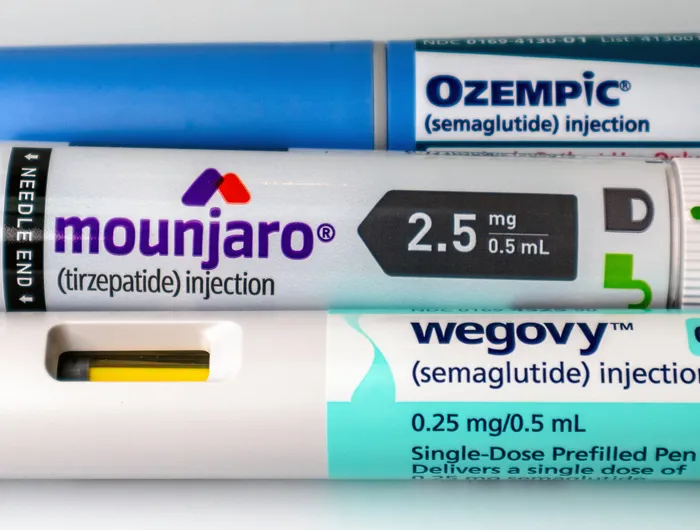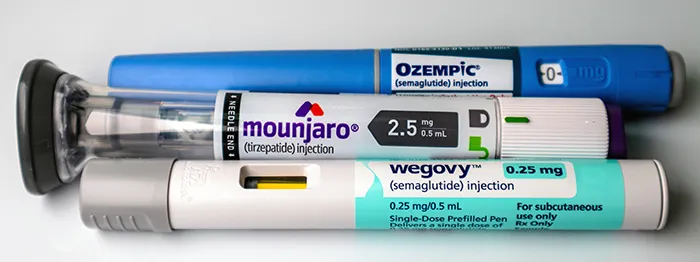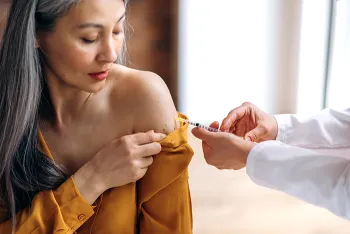A snapshot of the latest research on diet, exercise, and more

K KStock - stock.adobe.com.
Here's the latest research on brain health, GLP-1s, cancer and more.
- What makes people eat more?
- Which GLP-1 drug works best?
- Are there "good carbs"?
- Can red meat harm your health?
- Can a vaccine lower the risk of dementia?
- Can metformin help with osteoarthritis pain?
- Are ultra-processed foods linked to Parkinson’s?
- What's the best test to detect cancer in women with dense breasts?
What makes people eat more?

Does ultra-processing, calorie density, or soft texture make people overeat?
Scientists (partly funded by the food industry) had 69 adults eat as much as they wanted of one of several sandwiches on different days. Each was made largely of ultra-processed foods. The ingredients had either high or low calorie density (calories per bite) and either soft or hard textures. For example, they used higher- vs. lower-fat cheese, chicken, mayo, and butter to change calorie density and harder vs. softer bread and raw carrots to alter texture.
The volunteers ate 484 more calories (1,123 vs. 639) from the calorie-dense lunches and 89 more calories (926 vs. 837) from the softer lunches. And they swallowed twice as many calories (1,143) from the calorie-dense soft lunch than they did from the less-dense hard lunch (570).
What to do
Filling half your plate with vegetables or fruit is an easy way to cut calorie density, which mattered most.
Which GLP-1 drug works best?

Which GLP-1 drug leads to the most weight loss?
Researchers randomly assigned 751 people with obesity to the maximum doses of semaglutide (Ozempic or Wegovy) or tirzepatide (Mounjaro or Zepbound).
After 72 weeks, the semaglutide takers had lost 14 percent of their starting weight, while the tirzepatide takers had lost 20 percent. (The trial was funded by Eli Lilly, which makes tirzepatide.)
What to do
Tirzepatide wins, but semaglutide is pretty darn good.
Are there "good carbs"?

Carbs have a bad rap, but some are linked to what some researchers call “healthy aging”—that is, living to age 70 without any of 11 major chronic diseases or impaired memory, physical function, or mental health.
Scientists tracked 47,513 women for 32 years. Those who ate the most high-quality carbs (from fruits, non-starchy vegetables, whole grains, and legumes) had a 51 percent higher likelihood of healthy aging than those who ate the least. In contrast, women who ate the most refined carbs (white flour, added sugar, and potatoes) had a 15 percent lower likelihood of healthy aging than those who ate the least.
What to do
This study can’t prove that good carbs can keep you healthy. (Something else about people who eat them may explain the links.) But what have you got to lose?
Can red meat harm your health?

Heard that red meat doesn’t harm your heart? Think twice.
Researchers examined 44 clinical trials on red meat and cardiovascular outcomes like cholesterol, blood pressure, or inflammatory markers.
Trials that were funded by the red-meat industry reported either favorable (21 percent) or neutral (79 percent) cardiovascular outcomes. In contrast, those that were independently funded reported either unfavorable (73 percent) or neutral (27 percent) outcomes. Hmm.
What to do
Be skeptical of results from industry-funded studies.
Can a vaccine lower the risk of dementia?

A shingles (herpes zoster) vaccine may cut the risk of dementia.
Researchers compared dementia diagnoses in residents of Wales who did—or did not—get a shingles vaccine when it became available there in 2013. Those who got the vaccine were 20 percent less likely to be diagnosed with dementia over the next seven years.
What to do
It’s too early to know if the shingles vaccine lowers the risk of dementia. Also, this study looked at the old live attenuated vaccine, not Shingrix, the new recombinant vaccine. But if you’re 50 or older, it’s worth getting the Shingrix vaccine so you don’t get shingles, a painful, blistering rash caused by a reactivation of the virus that causes chicken pox.
Can metformin help with osteoarthritis pain?

Metformin, a drug that’s widely used to treat type 2 diabetes, may also curb knee pain in people with osteoarthritis.
Researchers randomly assigned 88 people with excess weight who had knee pain due to osteoarthritis for at least six months to take either metformin (2,000 milligrams a day) or a placebo. After six months, the metformin takers reported less knee pain than the placebo takers. They also reported less stiffness and better function.
What to do
The results are promising, but larger trials are needed, preferably with objective tests of knee function.
Are ultra-processed foods linked to Parkinson's?

Can ultra-processed foods raise the risk of Parkinson’s disease?
Researchers tracked 42,853 health professionals for roughly 26 years. Those who averaged 11 servings of ultra-processed foods per day were roughly 2½ times more likely to develop at least three pre-Parkinson’s symptoms than those who averaged just three servings per day. Those symptoms include constipation, body pain, and signs of depression.
(The researchers looked at what people ate at least six years before symptoms appeared to make sure that the symptoms weren’t causing people to eat ultra-processed foods.)
What to do
It’s too early to know if ultra-processed foods cause pre-Parkinson’s symptoms because something else about people who eat them may explain the results. But it can’t hurt to limit unhealthy ultra-processed foods like sugary beverages and sweet snacks.
What's the best test to detect cancer in women with dense breasts?

Ordinary mammograms can miss cancers in women who have dense breast tissue.
Researchers randomly assigned 6,305 women with dense breasts and no signs of cancer on an ordinary mammogram to get further imaging. The trial is ongoing, but the authors have reported interim results. (The study was partly funded by GE Healthcare, which sells imaging devices.)
Invasive cancers were detected in 15 out of every 1,000 women who had an abbreviated MRI, in 16 out of every 1,000 who had a contrast-enhanced mammogram, and in 4 out of every 1,000 who had an automated whole breast ultrasound.
What to do
Stay tuned.
Support CSPI today
As a nonprofit organization that takes no donations from industry or government, CSPI relies on the support of donors to continue our work in securing a safe, nutritious, and transparent food system. Every donation—no matter how small—helps CSPI continue improving food access, removing harmful additives, strengthening food safety, conducting and reviewing research, and reforming food labeling.
Please support CSPI today, and consider contributing monthly. Thank you.
More on preventing disease
A snapshot of the latest research on diet, exercise, and more
Healthy Eating

Is saturated fat good or bad?
Healthy Eating

Folic acid is the best choice for a healthy pregnancy
Fact vs. Fiction

Off-label use of COVID-19 vaccines was once discouraged but has become common amid new guidelines
Vaccines

Alzheimer’s: What may prevent, diagnose, or treat the disease
Preventing Disease


